Fair recruitment healthcare Germany
The Deutsche Kompetenzzentrum für internationale Fachkräfte in den Gesundheits- und Pflegeberufen (German Competence Center for International Healthcare and Nursing Professionals) developed the state seal of quality “Fair Recruitment Healthcare Germany” for the Federal Ministry of Health (BMG) in 2019 – 2021.
The “Fair Recruitment Healthcare Germany” seal of approval sets standards for the fair recruitment and placement of nursing professionals from third countries (countries outside the EU and EEA) via private sector service providers in the German nursing labor market.
Since July 2021, the DKF has been responsible for the further development of the requirements on which the quality seal is based and the specifications for technical and operational implementation (quality and test regulations and requirements catalog).
The state seal of quality
The state seal of quality
„Faire Anwerbung Pflege Deutschland“ of BMG
The “Fair Recruitment Healthcare Germany” seal of quality is a state seal from the Federal Republic of Germany for the private sector recruitment of nursing staff from abroad. The owner is the Federal Ministry of Health (BMG). The “Fair Recruitment Healthcare Germany” seal of approval is registered as a certification mark with the German Patent and Trademark Office.
(Registernummer 3020222387585).
Further information can be found on the website of the Bundesministeriums für Gesundheit
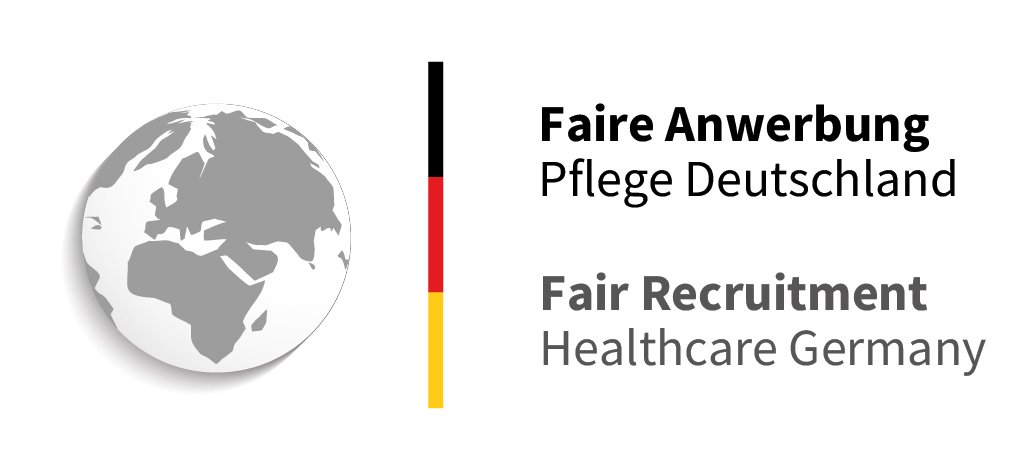
Presentation of the state seal of quality “Faire Anwerbung Pflege Deutschland”
KDA as publisher
Wilhelmine-Lübcke-Stiftung e.V. as publisher
The legal basis for the “Fair Recruitment Care Germany” seal of quality is the Act on Quality Assurance in the Recruitment of Nursing Staff from Abroad (AuslPflKrGewQSG).
Gesetz zur Sicherung der Qualität der Gewinnung von Pflegekräften aus dem Ausland (AuslPflKrGewQSG).
It designates the Kuratorium Deutsche Altershilfe Wilhelmine-Lübke-Stiftung e.V. as the publisher. The publication of the quality seal concerns the (further) development of the quality and testing regulations. In the KDA, the DKF, which is funded by the BMG by way of a grant, takes on the task of further development.
Furthermore, the KDA can appoint one or more competent, independent and reliable persons under private law as the awarding body. With the approval of the BMG, the KDA has appointed RAL Gütegemeinschaft Anwerbung und Vermittlung von Pflegekräften aus dem Ausland e.V. (GAPA) as the issuing body.
On the KDA Website you will find the currently valid quality and test regulations for the state seal of quality.
RAL quality mark of GAPA e.V.
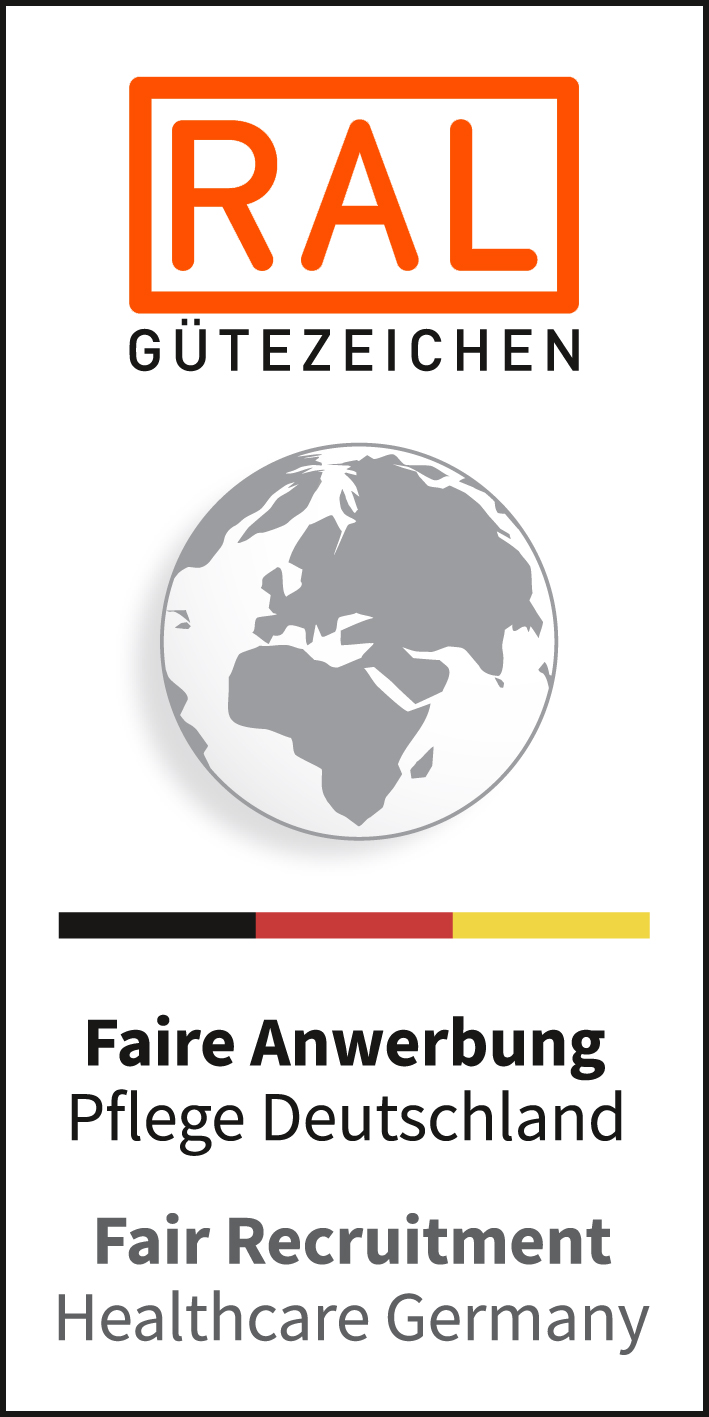
In agreement with the BMG and KDA, the RAL Quality Association for the Recruitment and Placement of Nursing Staff from Abroad (GAPA) issues the state seal of quality as a RAL quality mark (RAL GZ 912). In the quality and test regulations, the quality mark is identical to the quality seal.
As the awarding body, the Quality Association also monitors compliance with these criteria by the awarded companies. Companies interested in being awarded the quality mark and becoming a member of the Quality Association can find all the information they need here.
Health and care facilities that are looking for a personnel service agency with a quality label can find an overview of the companies that have been awarded the label here.
A complaints channel for international care professionals and other stakeholders in the event of violations of the seal of approval has been set up at acwedeking@kda.de .
You can find more information about GAPA e.V. (Quality Association) here.
Role of the DKF
The DKF’s activities are framed by the law to ensure the quality of the recruitment of nursing staff from abroad Gesetz zur Sicherung der Qualität der Gewinnung von Pflegekräften aus dem Ausland. Within the KDA, the DKF is responsible for the further development of the quality and testing regulations for the state seal of approval “Fair Recruitment of Nursing Care Germany”.
The DKF is guided by the ISEAL Code of Good Practice in order to make the further development of the quality and testing regulations participatory and comprehensible. This is an internationally recognized standard for the credibility of sustainability seals.
A distinction is made between two phases in the context of further development:
- Review – Examination of the need for further developmentThe answer to the question of whether there is a need for further development of the quality and testing regulations must be based on objective decision-making criteria. Monitoring data, learnings and recommendations from GAPA as well as feedback from stakeholders and developments in the international discourse on fair recruitment and nurse migration are included in this process.
- Revision – Further development
If a need for further development is identified, the phase of systematic further development begins: revision. In addition to public consultations, the KDA must comply with the legal requirement of an opinion procedure. The following stakeholders must be asked for a statement:
- Spitzenverband Bund der Krankenkassen (National Association of Health Insurance Funds)
- Deutsche Krankenhausgesellschaft (German Hospital Association)
- die Vereinigungen der Träger der Pflegeeinrichtungen auf Bundesebene (the associations of care facility providers at federal level)
- Verband der privaten Krankenversicherung e. V. (Association of private health insurance companies)
- die Verbände der Pflegeberufe auf Bundesebene (the associations of the nursing professions at federal level)
- die Bundesvereinigung der Deutschen Arbeitgeberverbände (The Confederation of German Employers’ Associations)
- der Deutsche Gewerkschaftsbund (the German Federation of Trade Unions)
At the end of the revision phase, the KDA applies to the BMG for approval of the further developed quality and testing regulations. The Federal Ministry of Health can only give its approval after a departmental procedure has been completed. The following departments must be involved:
- Bundesministerium für Arbeit und Soziales (Federal Ministry of Labor and Social Affairs (agreement))
- Bundesministerium für Bildung und Forschung (Federal Ministry of Education and Research (consultation))
- Bundesministerium für Familie, Senioren, Frauen und Jugend (Federal Ministry for Family Affairs, Senior Citizens, Women and Youth (consultation))
- das Ressort für Verbraucherschutz (the Department for Consumer Protection (consultation))
As soon as the Federal Ministry of Health has given its approval, the new quality and testing regulations for the national quality mark will come into force. With a time delay, they will also become binding for the RAL quality mark “Fair Recruitment Healthcare Germany” via the GAPA.
Once the revision (further development) has been completed and the updated Quality and Inspection Regulations have come into force, the review phase (examination of the need for further development) begins again. The DKF is responsible for the implementation and coordination of the review and revision for the “Fair Recruitment Healthcare Germany” quality seal. It provides timely information about the upcoming further development and opportunities for participation.
Contents of the seal of quality „Faire Anwerbung Pflege Deutschland“
The contents of the quality seal are defined in the so-called quality and test specifications. These are also known as the requirements catalog. The catalog of requirements can be downloaded here (in German only):
There are nine criteria in three quality areas, which are divided into a total of 36 indicators. All indicators must be demonstrably fulfilled in order to be awarded the seal of quality.
Overview of the quality areas and criteria:
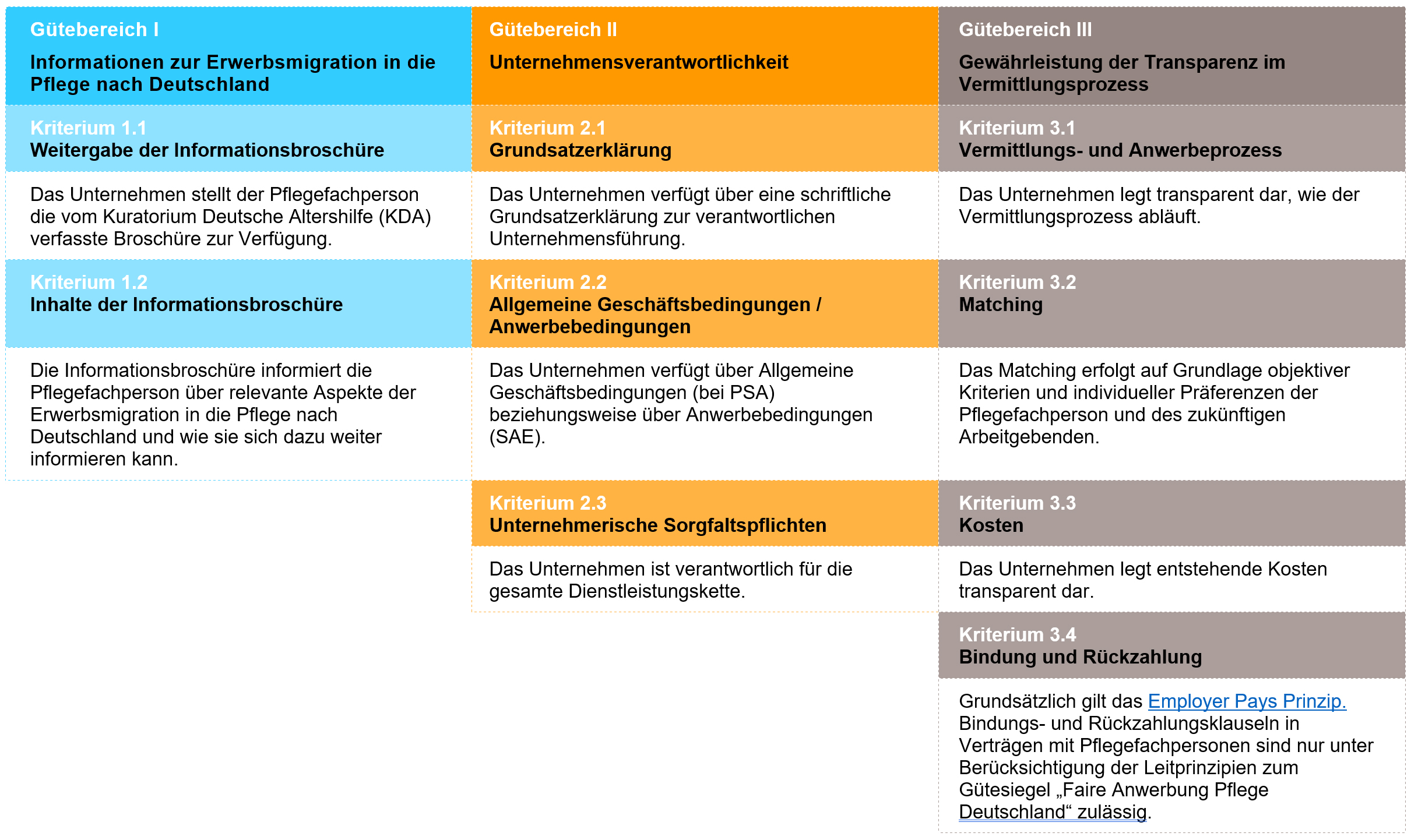
The most important regulatory content relates to expectation management, transparency in matching and corporate responsibility.
Expectation management
Fairness in the placement process only exists if all parties involved (placement company, employer and nursing professional) are clear at all times about the conditions they will agree to or have agreed to.
For the fair recruitment of nurses from abroad to Germany within the framework of the quality seal, this means that…
…the intended course of the process is communicated publicly and to the care professional.
It is the placement company’s responsibility to indicate which process steps are planned for both the employer and the care professional. Changes to the planned process flow must also be communicated in good time (criterion 3.1).
…internationally trained nurses were able to find out about the nursing profession and the nursing job market in Germany.
To this end, the KDA has developed an information brochure that serves as a neutral basis for decision-making and must be verifiably sent to the care professionals before a binding placement contract is concluded (quality area I).
Transparency and matching
The central task of the placement company is to find suitable nursing professionals abroad as future employees for its clients (nursing and healthcare companies) and to support them in initiating an employment relationship. This is known as matching.
The law stipulates that a recruitment agency must provide the person to be placed with information about the employer (see § 299 SGB III. This job offer provides information about important key data of the employment relationship offered. In addition, the employer has the opportunity to provide information about its measures and instruments for operational and social integration, language support and support during induction.
 With a well thought-out company integration management concept, an employer can position itself attractively in relation to care professionals. The DKF’s “„Welcome Culture & Integration Toolbox“ offers support in creating a company integration management concept.
With a well thought-out company integration management concept, an employer can position itself attractively in relation to care professionals. The DKF’s “„Welcome Culture & Integration Toolbox“ offers support in creating a company integration management concept.
When it comes to the fair recruitment of nurses from abroad to Germany as part of the quality seal, this means that…
…the nurse is presented with a job offer from a potential employer with relevant information on the position offered.
On this basis, the nursing professional can decide for or against the job offered. The placement agency explicitly does not allocate them to a specific employer (indicators 3.2.1, 3.2.2 and 3.2.3).
…the nurse and the potential employer can get to know each other before signing an employment contract.
Getting to know each other can take place in person or virtually (indicator 3.2.4).
…personal contact persons are known to the nurse at all times
both at the placement company and at the employer (indicators 3.1.2 and 3.2.1).
…the ordering principle applies.
The German employer has a vacancy to fill and “orders” the placement of a nursing professional from a third country from a personnel service agency. Accordingly, the employer pays principle applies, according to which the employer must pay for the placement and the associated costs (indicator 3.4.1).
Corporate responsibility
The placement of nurses from third countries is associated with entrepreneurial and human rights risks. The quality seal therefore includes the obligation to anchor the core elements of corporate due diligence in the company’s processes.
International recruitment of nurses takes place in a transnational setting. Companies work together with subsidiaries or other companies in the respective country of recruitment. This is often the case with language training, as it is not possible to travel to Germany for the purpose of recognition without knowledge of German.
Every entrepreneurial activity involves risks that must be dealt with responsibly. Even if the actions of subcontractors do not take place in the direct business area of the company with the seal of approval, this company has a responsibility, for example in the selection of business partners, the drafting of contracts and communication.
In the case of the fair recruitment of nursing staff from third countries to Germany within the framework of the quality seal, this means that the labeled company…
…has a declaration of principles with voluntary commitments to comply with international human rights standards.
This policy statement is publicly accessible and forms part of the documents relating to the recruitment contract (criterion 2.1). It contains a number of voluntary commitments, for example to the guiding principles of the seal of approval, but also to international human rights standards such as the WHO Global Code of Practice on the International Recruitment of Health Personnel and the International Labor Organization’s (ILO) General principles and operational guidelines for fair recruitment.
…contractually passes on the requirements of the quality seal when selecting business partners in the countries of origin.
International recruiting is a cross-border business area. It is therefore important that the requirements of the seal of approval are not only applied in Germany, but also in the country of recruitment. Companies that have been awarded the seal of approval undertake to ensure that the requirements of the seal of approval are also met by local business partners, subcontractors and subsidiaries outside Germany (indicator 2.2.4).
…considers and addresses human rights due diligence obligations in its internal quality and risk management.
Companies that have been awarded the seal of approval undertake to actively address the question of what risks their actions pose for their corporate due diligence and how they design their business processes in a preventive manner (indicator 2.3.1).
The seal of approval is based, among other things, on the UN Guiding Principles on Business and Human Rights, which describe the responsibility of companies to respect human rights. In international recruitment, this applies in particular to the prohibition of forced labor and labor exploitation.
Further Informationen
Contact:
Deutsches Kompetenzzentrum für internationale Fachkräfte in den Gesundheits- und Pflegeberufen (DKF)
im Kuratorium Deutsche Altershilfe (KDA)
Therese Bach

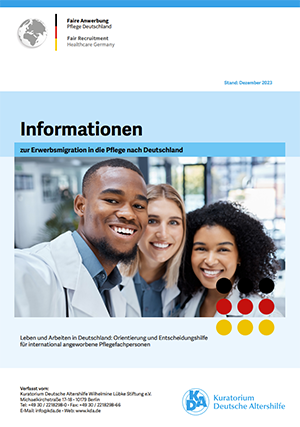



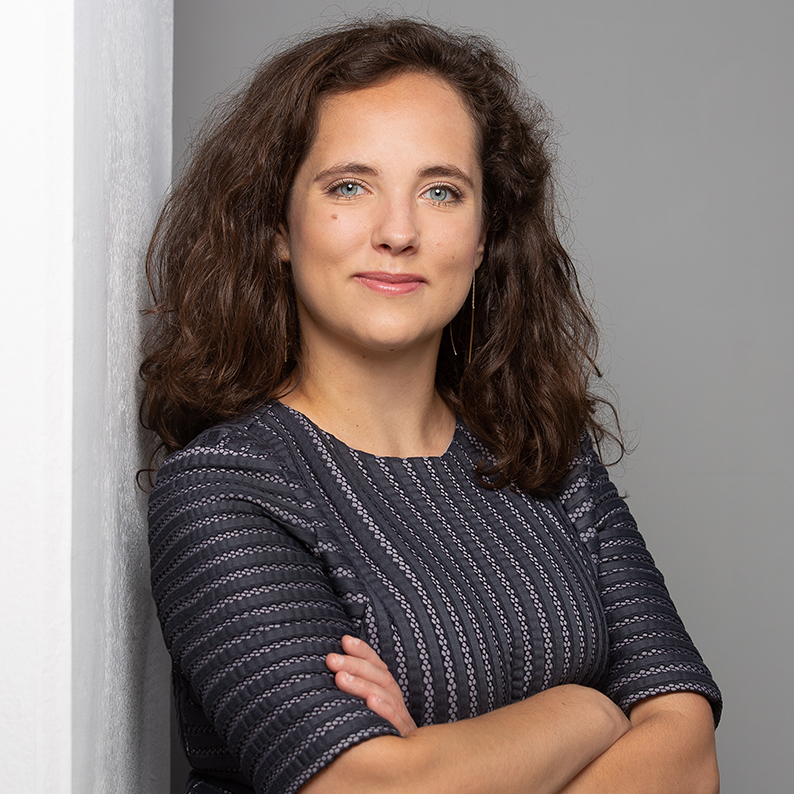
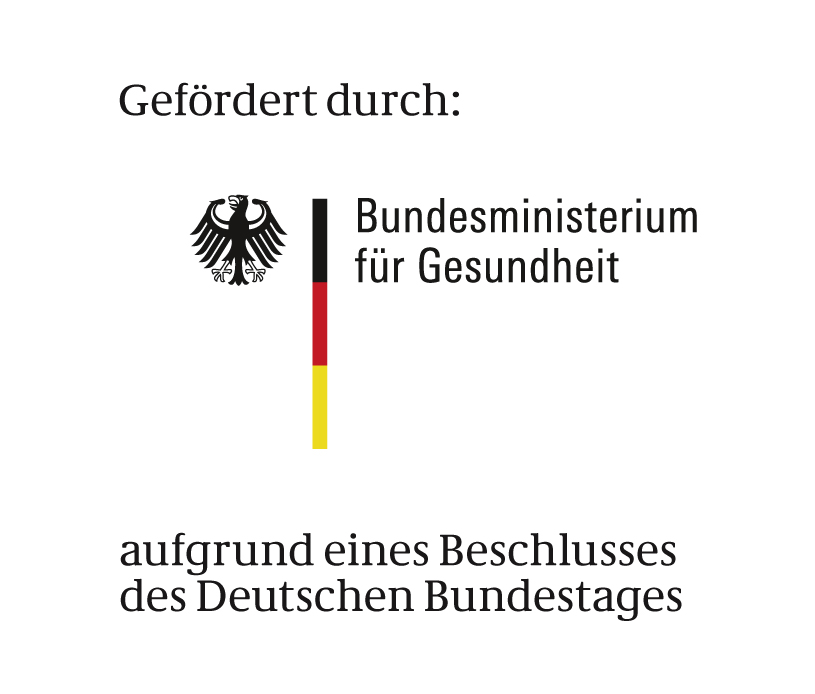

Follow us: